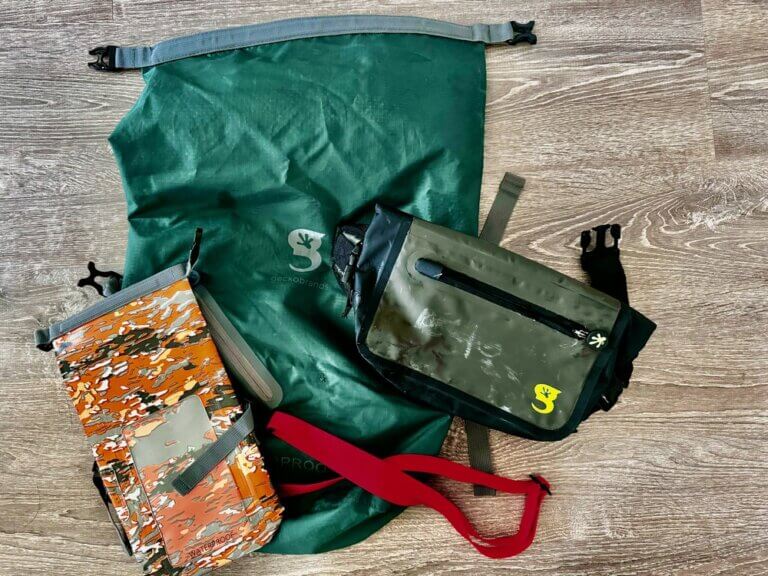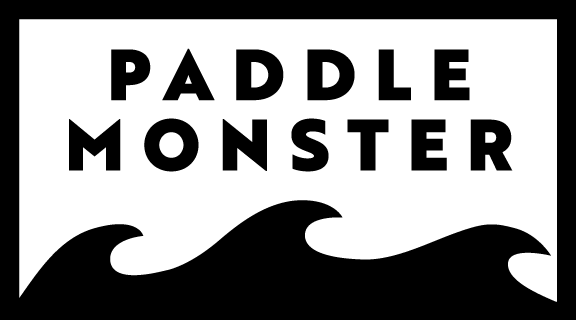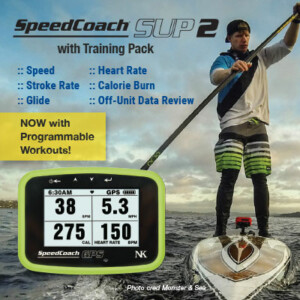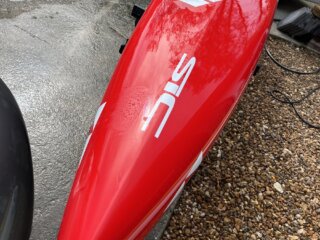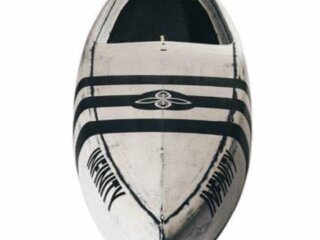
So, You Want to Coach?
One of the best ways to enjoy paddling is to help others. For starters, it’s more fun to do any activity in the company of others. It can add a social element to what you’re doing, whether it is training to race or for fitness, and it’s just a lot more enjoyable to share cool on-water experiences with like-minded individuals. But actually the taking the time to help another paddler adds a different element – the satisfaction of sharing your knowledge and expertise knowing that it is helping make someone else better. Helping others, at any level, is extremely rewarding.
In a previous issue, I covered how helping others can actually help you improve your own paddling (see Improve Your Own Paddling by Helping Others Improve Theirs ). There’s a very real benefit to breaking down the stroke so you can explain it in a way that makes sense to someone else. It helps you better understand it yourself, and the demonstrations and drills you share usually end up helping you execute your own stroke better.
There’s a lot to be said for coaching. It not only helps the paddlers you’re working with become better, but it can be extremely rewarding for you as the coach. So, what should you do if you’re interested in coaching?
Qualities of a good coach
There are lots of coaches in sport. Some of them are better than others. What are some of the qualities that one needs to possess to be a good coach?
Coaches need to be organized and good communicators. Organization isn’t just about being on top of your schedule and knowing who you’re coaching and when. It’s about having a clear plan on how you approach your teaching and being able to communicate your thoughts in a coherent fashion.
Coaches need to have empathy and be patient. The best thing a coach can do in this regard is remember what it was like when they were learning to paddle. Paddling is actually a pretty complex sport movement, made more difficult by the fact that you have to do it on both sides, in a variety of conditions, and that a considerable level of balance is involved. It takes time for paddlers to learn things, and some paddlers take longer to learn them than others. Remembering how challenging it can be can help a coach be both more empathetic and patient, creating a less threatening environment for the person being coached that makes their learning easier.
Good coaches have knowledge. There is no replacement for knowledge when coaching. If you’re trying to fake it, you’ll quickly be exposed. If you’re helping someone with their technique, you’ll need a sound knowledge of the stroke and drills that make learning the stroke easier. If you’re helping someone train, you’ll need a sound understanding of the human energy systems and how to develop both aerobic and anaerobic pathways of energy production. You’ll need to know about the development of strength and power, both on and off the water. And, you’ll need to have some understanding of the principles of periodization.
Good coaches are willing learners who, though knowledgeable, are always looking to learn more. And, good coaches are never afraid to admit what they don’t know.
Lastly, good coaches tend to have some core principles or a philosophy that goes a long way in determining how they approach what they do, present what they know, interact with others, and teach skills.
None of these qualities are beyond anybody. We all have the capacity to develop them and be effective coaches if we put our minds to it. We don’t have to be complete experts or “master coaches” to start. We can learn as we go. So, if that is the case, where do we start?
Tips for getting started as a coach
Before you get started, ask yourself if coaching is really something that you want to do and provide yourself with an honest answer. I firmly believe that anybody can coach but that coaching isn’t for everybody. You’ve got to want to do it and really try to develop the qualities mentioned above to the best of your ability. You’ve got to be as committed to learning and improving as you were as an athlete. It’s not for everybody. Some people would rather just be on the water for themselves and not for others. That’s okay. But for those that think they’d like to coach, the most important first step is knowing that coaching is something that you really want to do.
Once you’ve determined that you do, in fact, have a real interest in helping others improve there’s a bunch of things you can do to get started:
- Learn as much as you can about the sport. Just because you paddle, doesn’t necessarily mean you know enough to be a great coach. So, if coaching interests you, the first thing you should do is develop some level of intellectual curiosity about it. Learn as much as you can. These are the things that I have found extremely useful in learning, both in SUP and in sprint canoe:
-
- Ask questions. We all know who the local “expert” is. Ask them questions. When you go to races and get a chance to meet really knowledgeable people, be they athletes or coaches, don’t be shy. Introduce yourself and ask questions. Remember what these people tell you and write it down if necessary. Review what they’ve told you when you get home. Think it through. Make sense of it. Doing this over and over again is going to provide you with a wealth of knowledge to sift through and make your own.
-
- Read. There’s more written information available now then there has ever been. Whether it is about training, technique or race strategy, it’s not hard to find information. Read as much as you can. Again, you’ll have to read it, sort it, and make some sense of it in order to make it your own.
-
- Watch video. Watching others paddle is instructive. There’s an incredible amount of video available now on places like YouTube or social media. Watch as much as you can of as many top athletes as possible. Download the videos that really show the best views of them paddling so you can look at them in more detail in slow motion or frame-by-frame. Look for similarities and differences in how they paddle. Try to determine what they are doing with their paddle, their big muscles and their body weight to make their board move.
-
- Take clinics or coaching courses. I’d suggest taking as many clinics as you can. Not only are you going to learn things from those instructing, but you’re going to learn new ways to describe things. You’ll borrow bits and pieces of what you’ve heard from a variety of instructors and over time make them your own.
- Apply what you’re learning to your own paddling and training. It’s one thing to learn things, it’s another thing entirely to apply them. The best place to start is trying to apply them to your own paddling or training. Experimenting with your own technique and trying to apply new ideas in your stroke provides you with insights that will be useful in helping others. You’ll get a good idea of what works and what doesn’t, what to watch out for when trying something and, if you’re making mistakes, you’ll be making them on yourself and learning from them rather than making them on someone you’re supposed to be helping.
- Learn how to better describe what you’re doing when you’re paddling and how you think others should paddle. You can have all the knowledge in the world and paddle really well yourself, but if you can’t pass along that knowledge to others or describe what it feels like when you’re paddling properly, it’s not going to do you much good as a coach. I like to think about how I’d describe what I am feeling when I am paddling to someone else, and I spend great amounts of time thinking about how best to relate what I’ve learned to others. Knowing that people have different learning styles and conceptualize things differently, I try to come up with numerous ways to describe or demonstrate the same thing. This way, when I am coaching, if one approach doesn’t work I have a few others that I can try instead.
- Practice coaching by helping your training partners. If you paddle regularly with others, talk to them about working together. Ask them to take a look at your paddling with a critical eye and offer to do the same for them. Chances are you’ll learn some things from them that help you to paddle better, but you’ll also have an opportunity to get comfortable both assessing someone else’s technique and conveying ideas and concepts to them that help their paddling.
- Develop your own coaching philosophy. If you’ve had the privilege to work with a good coach, or see other good coaches in action, you’ll realize that good coaches have a confidence and manner that is grounded in their coaching philosophy. They each have their own unique approach that they have developed over the years from the experiences they’ve had. If want to be a good coach, start developing your coaching philosophy now. It can change and evolve as you gain experience, but start with a set of principles that can guide you in the way you interact with those you’re coaching, the way you present concepts and teach, the steps you take in technique development and how you structure your training. Your philosophy is a bit of a synthesis of all you’ve learned about the sport, about communication, and about empathy and respect for others.
- Promote yourself. If people are going to hire you to coach, they’re going to need to see you as someone with expertise. Unfortunately, when you’re just starting out, nobody really has an appreciation of the expertise you may have. You’re going to have to promote yourself as someone who knows what they’re doing. It’s not enough to make a post on social media in which you declare you’re a coach and ask people to sign up to a clinic or for private coaching sessions. You’re going to have to give something away, for free, that demonstrates your expertise, your ability to communicate, and your interest and talent in working with others.
Start small. Coach some novice paddlers for free. Run a training group for a group of novice paddlers for a summer, for free or for just a nominal fee. Get active on some social media sites and offer positive comments and content that isn’t overbearing but demonstrates that you know your stuff. Offer a clinic for beginner or novice paddlers. Be prepared to invest a summer doing this sort of thing without really making any money.
When I knew that I wanted to be a SUP coach I decided to give away a ton of knowledge I’d gained as an international flatwater canoe racer and coach. I made a website and wrote a ton of content. Slowly I developed a following that realized I was more than just a former Olympian racing SUP – I actually knew what I was talking about. Eventually people started approaching me to coach them and, when we launched Paddle Monster we had over 60 people join looking for coaching in the first 30 minutes we were live.
You don’t need a fancy website to get started. You don’t even need your own Facebook page to get started. You can just be a contributor to some of the pages that already exist. Post content regularly. Make it positive and interesting and informative. Comment on other people’s posts in an equally positive, supportive and helpful way. If you work at it, you’ll develop a following and from there you can make the jump to having people pay you for your knowledge and time. You just need to be prepared to put a lot of yourself out there before expecting people to pay you.
Final Thoughts
Coaching is insanely rewarding. The feeling of seeing people you’ve worked with achieve their goals in really special. And knowing that you can take anyone who struggles with technique and help them paddle better is a great feeling as well. You’ll find that if you’re able to do that, you’ll also be able to make yourself a better paddler. It is very true that if you’re willing to help others, you end up helping yourself.
Once you’ve started coaching you’ll settle into an approach that optimizes the use of your time, your knowledge and ability to communicate. You’ll also develop the skill of knowing how to tweak your approach to best fit the individual you’re dealing with. The key though, is to remember that you can never stop learning if you want to be good at it. You need to keep your thirst for knowledge and intellectual curiosity. You need to keep asking questions and looking for better ways, and you need to be willing to try new things. Don’t ever allow yourself to become the coach that is so set in their ways they lose the ability to be flexible. Flexibility and an open mind will allow you to help anyone in virtually in any circumstances.
Have fun with the process and happy coaching!
Larry
Paddle Events
DeSatnick Foundation Around the Cape Paddle
Ohio River Paddlefest Races
The Circumnavigation-Tilghman Island 2024
Recent Classifieds
SIC XRS 14 x 22
- Sell
- 2 days ago
- Stand Up Paddleboard
- Chattanooga , Tennessee United States
- 30 views
Wanted! Ocean / downwind 14 foot SUP
- Buy
- 3 days ago
- Stand Up Paddleboard
- Main Street , 07005 Boonton , New Jersey United States
- 28 views
one edge pro 2.0 hollow 14′ x 23.5”
- Sell
- 4 days ago
- Stand Up Paddleboard
- 53066 Oconomowoc , Wisconsin United States
- 71 views
2021 Starboard Allstar 14×24 5
- Sell
- 5 days ago
- Stand Up Paddleboard
- 21085 Joppatowne , Maryland United States
- 76 views
2023 SIC RS 14 x 24.5
- Sell
- 6 days ago
- Stand Up Paddleboard
- Hampton, VA
- 55 views
Subscribe for Premium Content and Coaching
Join the Paddle Monster paid Plan Today!
You May Also Like


Paddle Foundations: The Six Fundamentals of Paddle Technique
